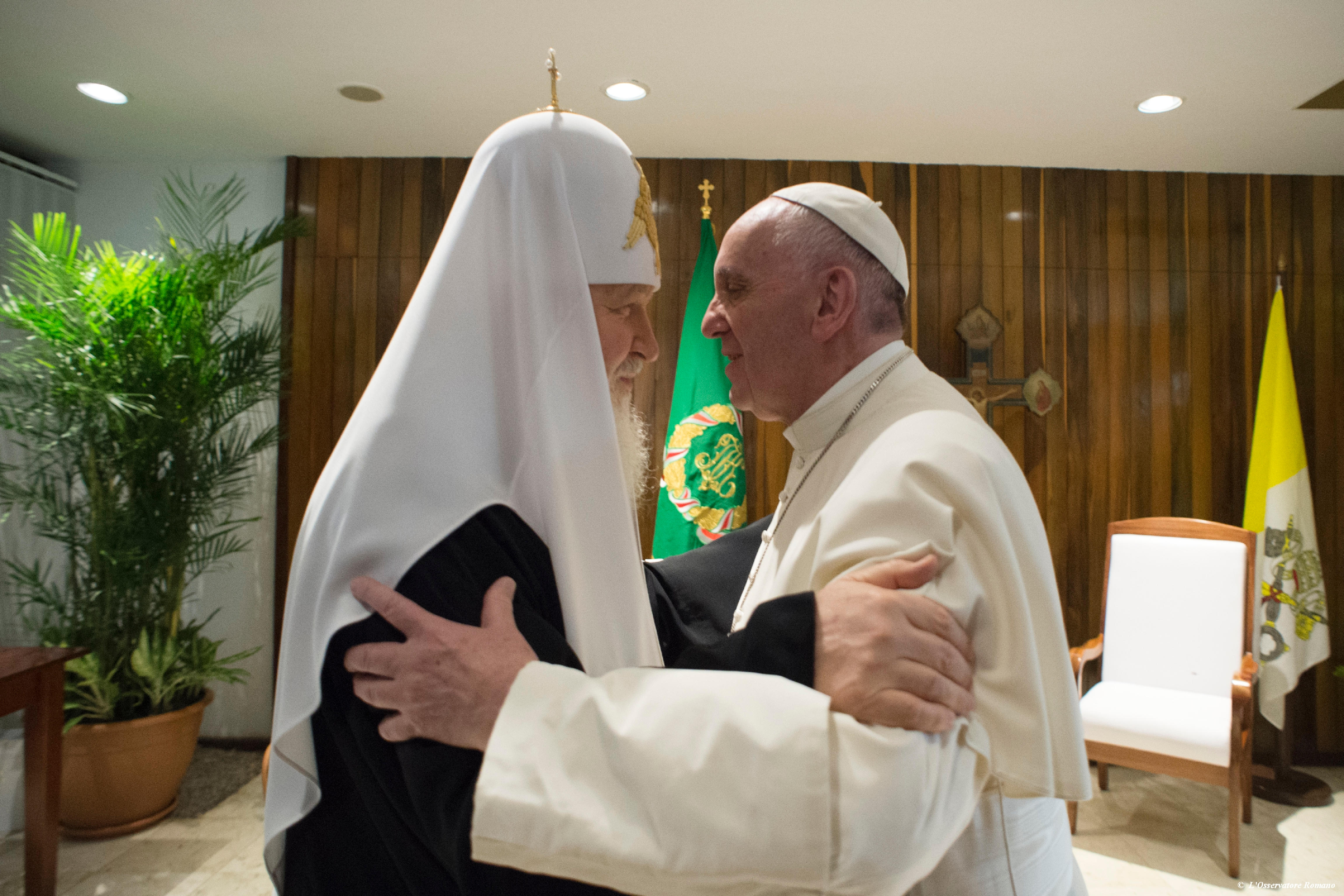A meeting that has already made history
The historical embrace between the Pope and the Patriarch in Cuba. In their joint Declaration they voice concern for persecuted Christians; their appeal to “make every effort” to end violence. They spoke of the family, life and euthanasia. “Much of the future of humanity will depend on our capacity to give shared witness to the Spirit of truth in these difficult times.”

A hug and three kisses, then a long deep gaze into each other’s eyes. Pope Francis and Patriarch Kirill of Moscow met in a lounge of the international airport in Havana. It is encounter that tears down a thousand years of distance, broadcast live by TV cameras worldwide. Then the exchange of jokes intercepted by open microphones: “Hermano, hermano, brother, brother, somos hermanos, finally!”, said Pope Francis. “Things are easier now”, Kirill said. “It is clear this is God’s will”, Francis replied.
The flashes and the lights of the cameras are switched off, the doors close and the two Primates remain in private conversation for two hours in a specially prepared room. When they go out, the delegations of the Holy See are waiting for them outside, in the front rows stand Cardinal Kurt Koch, president of the Pontifical Council for Promoting Christian Unity, and Metropolitan Hilarion, head of the Patriarch’s Department for External relations, who worked assiduously behind the scenes for the realization of the meeting. Before them, Kirill and Francesco signed a joint Declaration.
“We spent two hours in an open brotherly discussion”, said Patriarch Kirill, the first to take the floor. “It was a conversation filled with content that gave us the opportunity to understand and hear the position of the other. And the results of the conversation allow me to assure that currently both Churches can cooperate together”, and “with full responsibility” so that
“there may be no more war, so that human life be respected in the entire world; so that the foundations of human and family morality may be strengthened.”
In his short address Francis reaffirmed the foundations of his ecumenical commitment. “We spoke as brothers, we share the same baptism. We are bishops.” Also the Pope described it as a sincere conversation, “without mincing words.” Before leaving Havana Francis addressed the Cuban people and their president Raul Castro.
“If it continues this way, Cuba will become the ‘capital of unity’”, he said.
Ten pages divided into 30 paragraphs. The Declaration signed by Pope Francis and Patriarch Kirill is a comprehensive text that addresses a wide range of issues, all topical, all urgent. At the heart of the Declaration is a heartfelt appeal to the international community to “undertake every possible effort” to end violence and terrorism, and to contribute, through dialogue, to assure humanitarian aid and to return to the negotiating table for a swift return to civil peace in Syria and Iraq. Francis and Kirill have at heart the future of persecuted Christians and they unite their voices in the name of the ecumenism of blood where martyrdom makes no difference.
The bishops of the two Churches of Moscow and Rome appealed to Europe to “remain faithful to its Christian roots.” They expressed their joint concern “when certain political forces, guided by an often very aggressive secularist ideology, seek to relegate them to the margins of public life.” The Declaration speaks about the family based on marriage and on the love “between a man and a woman” conveying disappointment over the emergence of other forms of coexistence “placed on the same level as this union.” These are themes – concerning ethics and bioethics – on which the two Churches are on the same wavelength.
However, the question of “Uniatism”, linked to the Greek-Catholic Church and to Ukraine, is a more complex issue. This question is addressed in the Declaration with a courageous appeal to the Christian communities of reference: “Orthodox and Greek Catholics are in need of reconciliation and of mutually acceptable forms of co–existence.”
“Much of the future of humanity will depend on our capacity to give shared witness to the Spirit of truth in these difficult times.”
This responsibility and this awareness has led the two leaders to set aside centuries of misunderstandings and prejudice for an embrace that will turn a new page not only in the Church’s journey towards full and visible unity but also in the history of humanity as a whole, which at a time of wars waged in the name of God is in need of signs for hope. These signs show that however long and difficult, reconciliation processes are always possible.